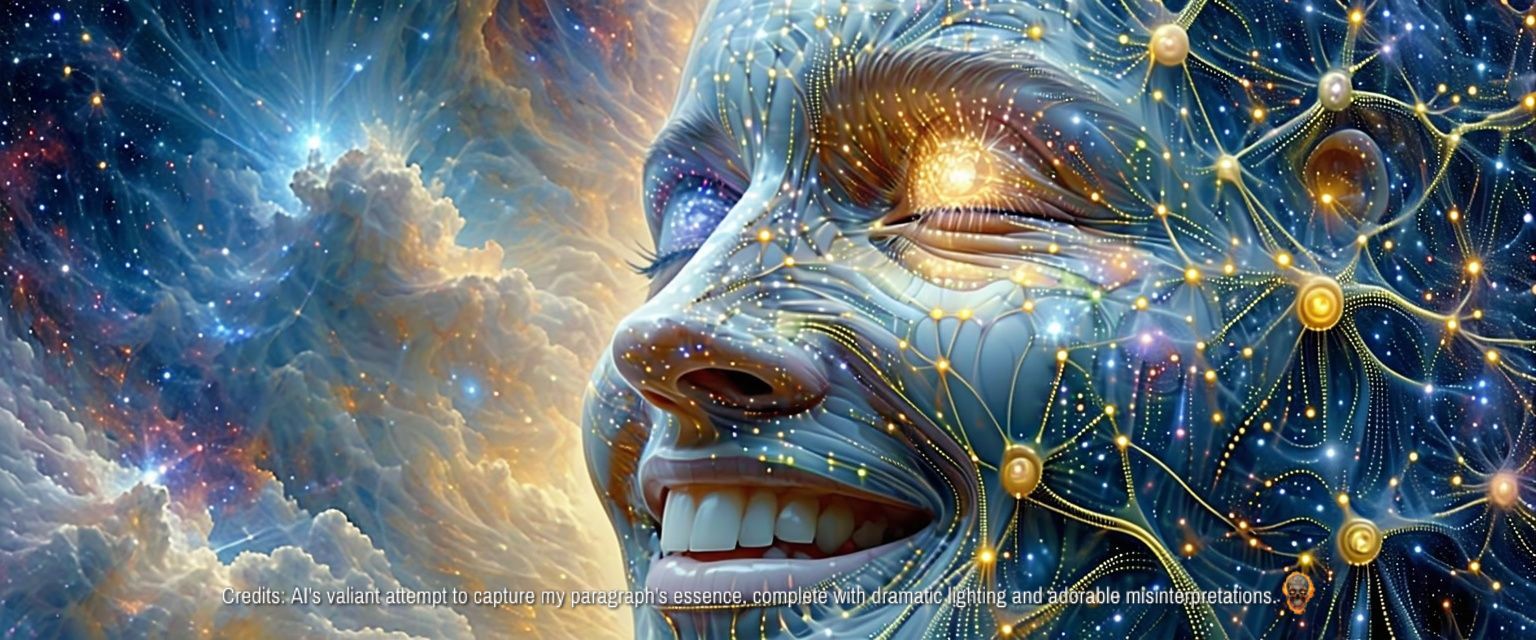The Mirage of Agency: Free Will Through the Lens of Nonduality
So, you think you’re the captain of your ship, the master of your fate? Cute. Adorable, even.
This whole free will charade – it’s the universe’s longest-running gag, and guess what? You’re the punchline. For centuries, philosophers have tied themselves in knots, theologians have pontificated, and now even the lab coats are chiming in, all trying to nail down this slippery phantom called free will.
Is it real? Is it an illusion? Are you a sovereign being, or just a meat puppet dancing to the tune of causality? Spoiler alert: it’s worse than you think. Or maybe, just maybe, it’s better. Depends on how attached you are to your precious little self, the one you imagine is calling all the shots. We’re going to rip the bandages off this one. We’ll look at the standard story, the one that props up your ego and makes you feel important. Then we’ll kick over the anthill and see what scurries out when the cold light of nondual reality hits it. This isn’t about comforting bedtime stories or philosophical hair-splitting. This is about waking up to what is, not what you wish it were.
If you’re looking for validation of your specialness, you’re in the wrong place. If you’re ready to confront the mirage, to see the strings on the puppet, then maybe, just maybe, you’re ready for this. But don’t say I didn’t warn you. The truth doesn’t care about your precious feelings…
…and neither do I.
The Conventional Straitjacket: Why You Cling to the Lie of Free Will
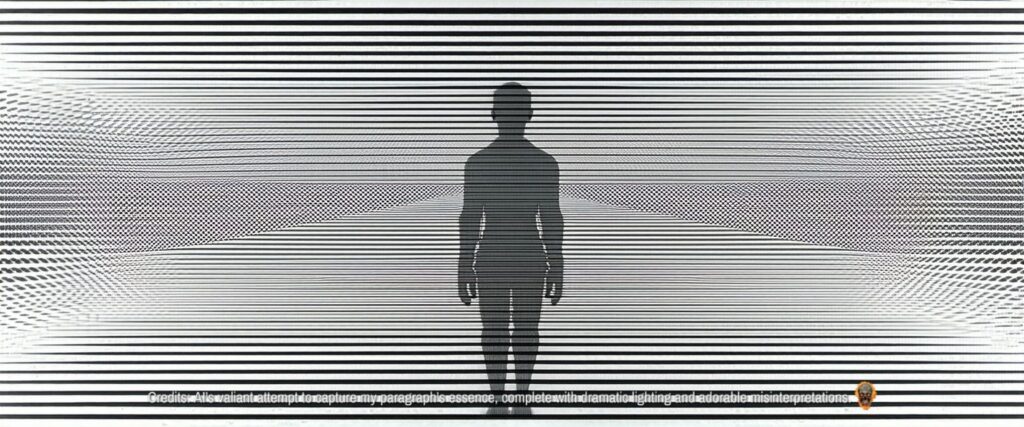
Let’s start with the basics, the stuff they spoon-feed you from day one.
You feel like you make choices, right? Coffee or tea? Turn left or right? Love or hate? It sure seems like there’s a little CEO in your head, weighing options, making executive decisions, and taking full credit (or blame) for the outcomes. This is the bedrock of the dualistic view: a separate, independent you, endowed with the magical power of volition, navigating a world of cause and effect like a tiny god in your own personal universe.
Philosophers have dressed this up in fancy language for millennia. They talk about libertarian free will – the idea that you could have genuinely chosen otherwise, that your choices are not predetermined by the relentless chain of causality. They construct elaborate arguments about moral responsibility, arguing that without this special brand of freedom, society would crumble, justice would be a joke, and we’d all be off the hook for our screw-ups. It’s a comforting narrative, isn’t it? It makes you the hero (or villain) of your own story. It gives meaning to your struggles and significance to your triumphs.
This subjective feeling of freedom is a powerful drug. It’s the cornerstone of legal systems, religious doctrines, and personal relationships. “I choose, therefore I am… responsible.” It’s the ego’s favorite mantra. Because if there’s no chooser, what happens to the precious self? What happens to accountability, praise, blame, sin, and redemption? The whole edifice of human drama seems to teeter on this single point of an independent will.
This isn’t just some abstract philosophical debate. It’s deeply personal. The belief in your own agency, your power to steer your life, is probably one of the most fundamental assumptions you hold. It’s the invisible framework upon which you’ve built your identity, your aspirations, your regrets. To question it is to question the very foundation of who you think you are. And that, my friend, is precisely what we’re here to do. Because that foundation? It’s built on sand. Quicksand, actually. And the tide is coming in.
The conventional view of free will isn’t a pathway to freedom; it’s a straitjacket. It binds you to a fictional character…
…a self-important ghost in the machine that you’ve mistaken for the driver.
Cracks in the Foundation: Scientific and Cross-Cultural Pointers
So, you’re still clinging to your little security blanket of personal agency? Again, how adorable.
Let’s see how well it holds up when we start yanking on a few threads. The ivory tower eggheads and the lab-coat crowd have been poking at this free will delusion for a while now, and even they’re starting to see the emperor has no clothes. And if you dare to look beyond your own backyard, you’ll find the rest of the world isn’t nearly as obsessed with your precious individual choice as you are.
Neuroscience | The Brain Called: “You’re Not in Charge!”
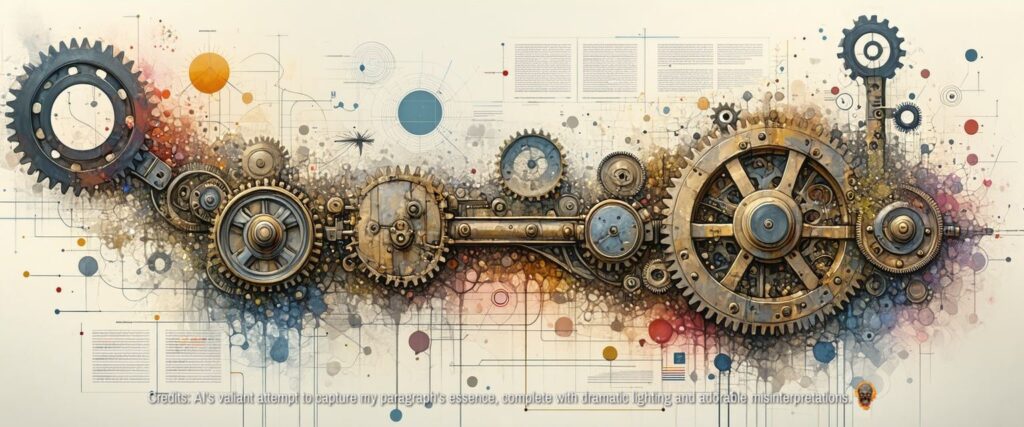
Ever heard of Benjamin Libet?
Back in the 80s, this guy and his buddies wired people up and basically found out your brain makes a decision before you even know you’ve made it.
They saw this blip of brain activity, the ‘readiness potential,’ firing off a good half-second before people reported consciously deciding to flick their wrist. Half a second. An eternity in brain time. So much for your conscious will being the grand initiator. It’s more like the press secretary, showing up late to announce what the real boss already decided in a back room you didn’t even know existed.
Of course, the philosophers and the apologists for free will threw a fit. “Oh, but the W-time is unreliable!” “The readiness potential is just preparation, not the decision itself!” Blah, blah, blah. They squawked and flapped, but the evidence kept piling up. Later studies with fancier brain scanners (fMRI, for the geeks) claimed they could predict your choices a whopping seven to ten seconds before you were consciously aware of them. Ten seconds! Your brain’s already moved on to the next item on the agenda while your conscious self is still fumbling for the ‘decide’ button.
Some try to salvage a shred of dignity by pointing to a ‘veto power’ – maybe you can’t start the action, but you can stop it! Whoop-de-doo. That’s like saying you can’t steer the runaway train, but you might, just might, be able to pull the emergency brake if you’re quick enough and the brakes haven’t already been cut. It’s a pathetic consolation prize for a dethroned king.
More recent takes suggest this readiness potential isn’t even a specific decision signal, but more like the background hum of your brain’s machinery, a random fluctuation that occasionally crosses a threshold and, whoops, there goes an action. Your conscious experience of deciding? That’s just the story your brain spins after the fact to make sense of it all, to maintain the illusion that there’s a ‘you’ in there pulling the levers. It’s a post-hoc rationalization, a neat little narrative package to keep the ego from having a meltdown.
The science, if you’re brave enough to look at it without flinching, points to a system operating largely on autopilot, with self-awareness as a bewildered passenger who occasionally gets handed a fake steering wheel…
…to keep it occupied.
Cross-Cultural Perspectives: Your Free Will Isn’t Everyone’s Fetish
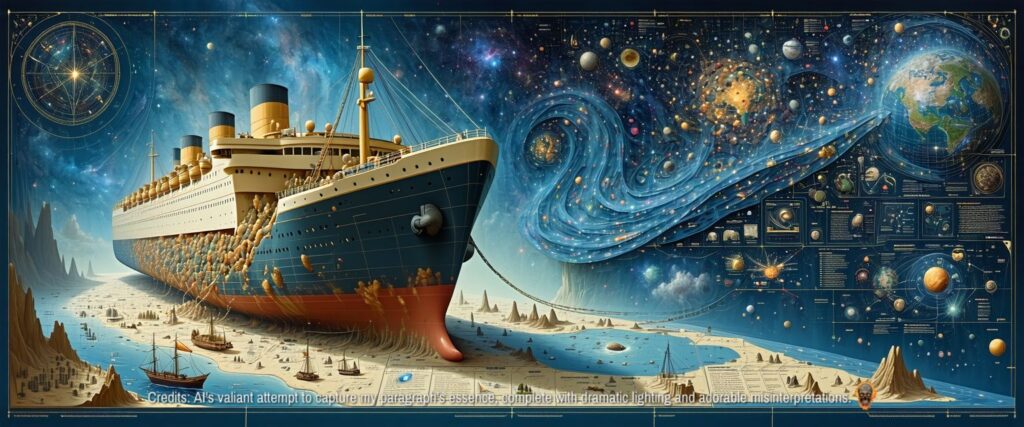
And here’s another kick in the pants for your self-importance:
This whole Western obsession with ‘free will’ as some sacred, individual power? It’s not exactly a global phenomenon. Turns out, most of the world hasn’t built its entire philosophical and psychological edifice on this particular brand of make-believe.
Researchers who bothered to look outside their WEIRD (Western, Educated, Industrialized, Rich, Democratic – get it?) little bubble found that the concept of ‘free will’ as defined by your average philosophy 101 textbook doesn’t even translate properly into many languages. Try explaining the nuances of incompatibilism versus compatibilism to someone whose cultural framework views agency through the lens of karma, communal obligation, or harmony with the Tao. They’ll likely stare at you like you’ve grown a second head.
In many Eastern traditions, for instance, the emphasis isn’t on an isolated individual heroically forging their destiny through sheer willpower. It’s often about understanding causality (karma), fulfilling your role within a larger social or cosmic order (dharma, Confucian ethics), or aligning with the natural flow of existence (Taoism). The idea of a rugged individualist, a self-made man pulling himself up by his own volitional bootstraps, is largely a Western export, a cultural artifact you’ve mistaken for a universal truth.
When you strip away the Western philosophical baggage, the concept of ‘free will’ often boils down to something much simpler in other cultures: acting on your own desires, without overt coercion. But the metaphysical superstructure of an uncaused causer, a soul-entity standing outside the stream of causality making undetermined choices? That’s your special brand of crazy, not a human universal.
So, the lab coats are showing the ‘chooser’ is late to its own party, and a trip around the globe reveals that the party itself isn’t even on most people’s social calendar. The cracks in the foundation of your cherished belief are starting to look more like gaping chasms. Still feeling like the captain of that ship? Or are you starting to suspect you’re just a barnacle clinging to the hull…
…along for a ride you never really controlled?
The Long Shadow of Thought: A History of the “Problem”

Oh, you thought this free will headache was a modern invention?
Something cooked up by existentialists in smoky Parisian cafes or neuroscientists with too much grant money? Bless your innocent heart. Humanity has been wrestling with this phantom, this itch it can’t quite scratch, since we first crawled out of the primordial ooze and started telling stories around the campfire.
Way back when, the Greeks were already tying themselves in philosophical knots over it. Homer and Hesiod had gods yanking human strings, fate dictating every move. Yet, even then, there was this nagging sense that humans were somehow responsible for the mess they made. The tragedians, those ancient dramatists, loved this stuff – characters doomed by prophecy, yet still flailing about as if their choices mattered, parading their suffering for the amusement of the gods and the groundlings. It’s a cosmic joke, and we’ve been the butt of it for millennia.
Then came Socrates, Plato, and Aristotle – the big guns of ancient thought. Socrates, bless his hemlock-sipping soul, thought if you just knew what was good, you’d do it. Ignorance was the only sin. A neat little package, but it kind of sidesteps the whole ‘choice’ thing, doesn’t it? Plato, his star pupil, was all about reason wrestling the beastly appetites into submission. Freedom, for him, was your inner philosopher king finally getting a grip on the unruly mob in your head. Noble, but still assumes there’s a ‘king’ to do the gripping.
Aristotle, the pragmatist, tried to get more specific. He talked about voluntary actions, things that ‘originate within us.’ He even acknowledged chance, accidents, breaks in the causal chain. He was onto something, that old Stagirite. He saw that if everything was just one long, unbroken chain of cause and effect, then ‘responsibility’ was a meaningless word. But even he couldn’t quite pin down the ghost in the machine.
Then the Hellenistic schools took over, and the debate got even juicier. The Epicureans, those ancient materialists, imagined atoms swerving randomly in the void – the famous ‘clinamen’ – to make room for a little wiggle in the deterministic machinery. A random swerve as the basis for your profound moral choices? Sounds a bit like basing your life decisions on a coin flip, but hey, they were trying.
Across the aisle, the Stoics were the ultimate determinists. Everything, and they meant everything, was governed by an all-pervading divine Reason, or Fate. Your life was a script, written in stone from the beginning of time. Yet, somehow, they still wanted you to be virtuous and responsible. Their trick? You couldn’t choose what happened, but you could choose your attitude towards it. You could assent to your fate like a good little soldier. Freedom, for the Stoics, was the ‘freedom’ of a dog tied to a cart – it can either trot along willingly or get dragged. Some choice, huh? Chrysippus, one of their main men, tried to soften it by saying your actions are determined in part by you, but still fated. It’s the granddaddy of all compatibilist tap-dancing, trying to have your deterministic cake and eat your free will too.
And so it went, century after century. Thinkers like Alexander of Aphrodisias screaming for a real, robust, up-to-us freedom, not some Stoic cop-out. Plotinus and the Neoplatonists talking about the soul aligning with the divine Intellect to find true liberation, far from the messy determinism of the material world. It’s a long, convoluted history of brilliant minds chasing their own tails, trying to reconcile the undeniable feeling of making choices with the equally undeniable logic of causality.
Fast forward through the theologians wrestling with God’s foreknowledge versus human sin – Augustine, Pelagius, Aquinas, Scotus – all performing intellectual acrobatics to absolve God of being the ultimate puppet master while still keeping humans on the hook for their transgressions. It’s a theological shell game, and the pea is always just out of sight.
Then the Enlightenment, the so-called Age of Reason. Hobbes, Locke, Hume – the British empiricists mostly landed on some form of compatibilism. Freedom is just acting without external constraint, even if your will itself is as determined as a rock rolling downhill. Hume, the arch-skeptic, even argued that if your actions weren’t determined by your character and motives, they’d just be random, and how could you be responsible for that? He had a point, the crafty bugger. He impaled the libertarians on the other horn of the dilemma: if it’s not determined, it’s random, and neither looks much like the free will you’re so fond of.
Kant tried to have it both ways with his phenomenal and noumenal worlds – determined in the everyday world, but somehow magically free in some inaccessible realm of pure reason. Clever, but ultimately another way to hide the pea.
And on it goes, into the modern era. Libertarians still fighting for a ghost of uncaused agency, compatibilists still trying to redefine freedom into something that can survive the onslaught of science, and hard determinists (now often armed with neuroscience) gleefully declaring the whole thing a sham.
What’s the takeaway from this grand historical tour of intellectual frustration? That the ‘problem’ of free will isn’t a problem to be solved. It’s a symptom of a deeper misunderstanding, a conceptual knot tied by language and the ego’s desperate need to be in charge. These thinkers, for all their genius, were mostly looking for something that isn’t there, in a place it could never be. They were chasing a mirage, and the harder they ran, the further it receded. The history of the free will debate isn’t a story of progress…
…it’s a testament to the enduring power of an illusion.
Word Traps: Language and the Illusion of the Doer
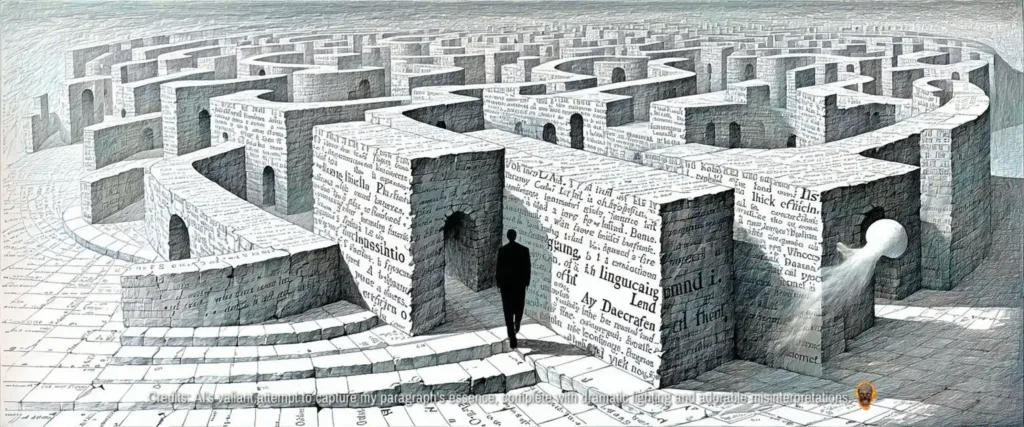
And if the science and the history weren’t enough to make your head spin, let’s talk about the very words you use.
Language. That magnificent, treacherous tool that shapes your reality whether you realize it or not. You think you’re using language? More often than not, language is using you, twisting your perceptions, creating entities out of thin air, and propping up the grand illusion of a separate, choosing self.
Take a guy like Wittgenstein. He wasn’t interested in some spooky inner phenomenon called ‘the will.’ He’d tell you the will isn’t something you find by looking inside, like a lost set of car keys. The whole idea of a specific, identifiable ‘experience of free will’ is a philosophical phantom, born from the misuse of language. We talk about ‘willing’ an action, and then we go hunting for the ‘willing’ experience, as if it’s a distinct sensation like an itch or a pang of hunger. It’s a fool’s errand.
Wittgenstein would say, look at the ‘language games.’ How do we actually use words like ‘intention,’ ‘agency,’ ‘choice’ in everyday life? We use them to navigate social interactions, to assign responsibility, to make sense of behavior. But then philosophers (and you, in your more navel-gazing moments) rip these words out of their practical context, stick them under a metaphysical microscope, and get all bewildered when they don’t reveal some mystical essence of selfhood. Language, as he put it, bewitches our intelligence. We create these conceptual cages and then wonder why we feel trapped.
If there’s no specific, isolatable experience of agency to begin with, then what exactly is this ‘illusion of free will’ that everyone’s so worked up about? An illusion needs a contrast – the stick looks bent in water, but it’s really straight. What’s the ‘really’ here? The problem isn’t that your experience of free will is an illusion; the problem is the very notion that there’s a distinct ‘experience of free will’ to be illusory in the first place. It’s a linguistic sleight of hand, a conceptual muddle.
Other thinkers, peering into the abyss of mysticism and consciousness, come at it from a different angle but arrive at a similar demolition site. They look at how the sense of agency, the feeling of being a ‘doer,’ is constructed. It’s not that you, the independent entity, decide to act and then act. It’s more like action arises, and then the thought ‘I did that’ crystallizes around it, like frost on a windowpane. The ‘I’ is a post-hoc add-on, a label slapped onto an impersonal event to make it fit the narrative of a personal life.
Consider the mystics, like Meister Eckhart, talking about going “wholly out from your own will,” or Ramana Maharshi pointing to the ultimate unreality of the individual ego. These aren’t just poetic flourishes. They’re pointing to a direct seeing that the ‘doer’ you cherish is a phantom. When the illusion of agency is seen through, what’s left isn’t a void, but the seamless, uncaused happening of reality itself. The idea that conscious will is the prime mover is, from this perspective, a cosmic joke. Dennett might call it an illusion in the sense that it’s not what we intuitively think it is – a kind of user-illusion that helps us navigate the world. But from a more radical nondual standpoint, it’s an illusion, period. A story the mind tells itself.
Even the hard-nosed atheists who deny free will can get tangled in their own linguistic nets. They argue that belief in gods is an evolutionary byproduct of our tendency to project agency onto the world. Fair enough. But what happens when their own scientific worldview starts to erode the very notion of their own agency? If your sense of being a conscious, willing self is also an illusion, a trick of the brain, then the whole agency-projection argument starts to eat its own tail. It’s a beautiful irony. The tools used to dismantle God end up dismantling the dismantler.
Language creates the ‘chooser.’ It carves up the seamless flow of reality into subjects and objects, doers and deeds. And once you’ve got a ‘doer,’ you’ve got to give it something to do – hence, ‘free will.’ It’s a package deal, a conceptual trap. Break the spell of language, see the ‘doer’ for the linguistic ghost it is, and the ‘problem’ of free will simply evaporates. It was never really there to begin with. It was just words, chasing words…
…in the echo chamber of a mind that had forgotten its own nature.
So What? Living Without a Chooser
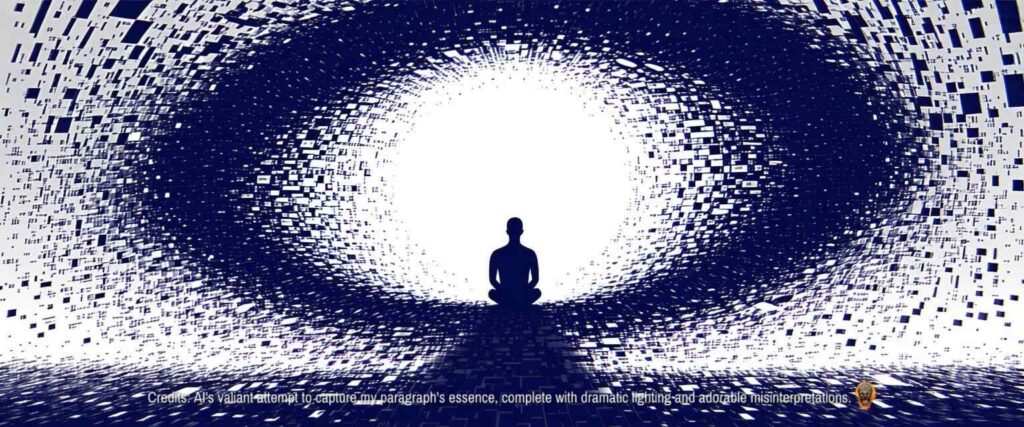
Alright, so the rug’s been pulled.
The little man behind the curtain has been exposed as a figment of your overactive imagination. Free will is a conceptual unicorn, a story you tell yourself to sleep at night. The brain’s running the show, culture’s shaped your script, history’s a long tale of everyone else being just as confused, and language is the prison guard. So, what now? Do you just curl up in a fetal position and wait for the heat death of the universe? Or is there something else on the menu?
This is where the rubber meets the road, where the abstract demolition derby of philosophy crashes into your so-called life. What does it actually mean to live without the illusion of a personal doer, a captain of your soul? Most people freak out at this point. “If I’m not in charge, what’s the point? Why not just rob a bank? Why get out of bed?” It’s the ego throwing a tantrum, terrified of its own obsolescence.
But here’s the kicker: the absence of a chooser doesn’t mean the absence of action. It doesn’t mean paralysis or nihilism. Life goes on, decisions get made, breakfast gets eaten. The only thing that changes is the story you tell yourself about it. The suffering, the angst, the endless internal debate – that’s all tied to the belief in a separate self who is responsible for it all, who could have done otherwise, who is constantly being judged by some imaginary cosmic courtroom.
When the ‘chooser’ dissolves, what’s left is just… happening. Spontaneity. The universe unfolding, unimpeded by your neurotic second-guessing. Think about it. When you’re truly absorbed in something – playing music, writing, even just chopping vegetables – where is the ‘you’ that’s deciding every little movement? It’s gone. There’s just the flow, the action itself. That’s a taste of it.
People who’ve had a glimpse beyond the veil, the ones who’ve seen through the illusion of agency, don’t suddenly become drooling vegetables. If anything, they often report a sense of profound liberation, a lightness. The burden of being ‘me,’ with all its attendant fears and desires and responsibilities, is lifted. Decisions still happen, but they arise from a deeper, more intuitive place, or simply as the most obvious response to the situation at hand. There’s less internal friction, less agonizing, less ‘what if.’
Rupert Spira, one of those chaps who talks about this stuff without (too much) spiritual fluff, points out that understanding non-duality isn’t about applying it to make better decisions. That’s just the ego trying to co-opt the teaching for its own ends. It’s about recognizing your true nature as awareness itself. From that recognition, actions flow. Pain might still be unpleasant – your body’s still a body – but the story of ‘my pain,’ the suffering that comes from identifying with it as a personal affliction, starts to unravel.
When you’re lost in thought, just noticing that you’re lost in thought is the first step. You shift from being the thought to being the awareness of the thought. That’s the crack where the light gets in. And the more you investigate that ‘I’ who needs, wants, suffers, the more you see it’s a ghost, a collection of conditioned responses and beliefs, not a solid entity.
So, how do decisions get made in this choiceless awareness? They just… get made. Like your heart beats or your lungs breathe. There’s an intelligence at play, but it’s not your personal, egoic intelligence. It’s the intelligence of the universe, the same intelligence that grows a tree and spins the galaxies. You think you need to be in charge of that? Good luck.
The practical implication isn’t a new set of rules for living. It’s the dropping away of the rule-maker. It’s seeing that the game was rigged from the start, but not in a sinister way. It was rigged because there was never a separate player to begin with. There was only the game. And when you see that, really see it, then you can finally stop trying to win and just… play. Or, more accurately, be played. And that, paradoxically, is where true freedom lies – not in the power to choose, but in the liberation from the illusion of a chooser.
It’s not about becoming a better person or making wiser choices. It’s about the person and the chooser dissolving into the background hum of existence. What’s left is just life, raw and unfiltered, unfolding perfectly, with or without your two cents…
…and that, my friend, is a punchline worth waiting for.
What’s Left When The Chooser Is Gone?

So, there you have it. The grand tour of the free will charade.
From the twitching neurons in your skull to the dusty scrolls of ancient philosophers, from the quirks of language to the deafening silence of nondual reality – it all points to the same colossal joke: there’s no one home. The captain you thought was steering the ship? A ghost. The choices you thought were yours? Echoes in an empty room.
This isn’t bad news. It’s only bad news for the ego, that terrified little tyrant who’s been running your life based on a lie. For what’s actually here, for the vast, impersonal intelligence that is reality, it’s just another Tuesday. The universe doesn’t need your permission to unfold. It doesn’t need your choices to animate it. It just is.
Dropping the illusion of free will isn’t about becoming a nihilistic blob. It’s about waking up from a dream of control, a dream of separation. It’s about seeing that you are not the wave, but the ocean. And the ocean doesn’t choose to wave; it just waves.
What’s left when the chooser is gone? Everything. Life, in all its messy, unpredictable, glorious unfolding. Without the filter of ‘me’ and ‘mine,’ without the constant anxiety of making the ‘right’ choice, what remains is simply what is. And what is, is already whole, already complete, already free.
So, laugh. It’s a good joke. The best, really. The cosmic punchline is you…
…or rather, the you that never was.


